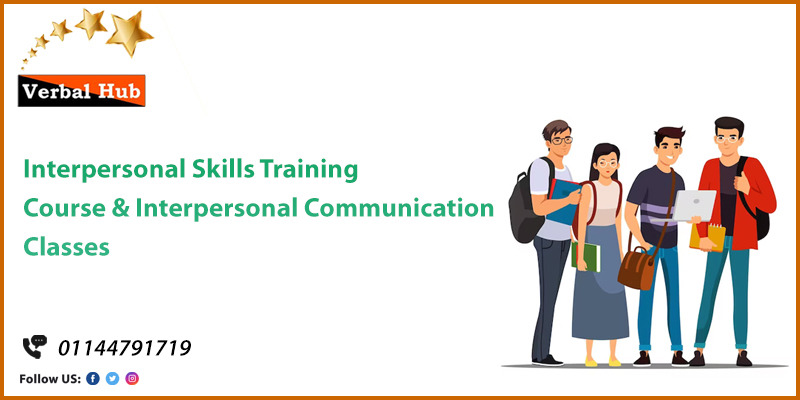Join the Interpersonal Skills Course
Interpersonal skills refer to the abilities that we use to communicate, interact, and collaborate with others effectively. Additionally, above mentioned skills plus personal and professional relationships play a vital role in career growth. What if you don’t find these skills in yourself, here we “VerbalHub” are.

VerbalHub’s Interpersonal Skills Training
Verbalhub introduces a complete personality development program that primarily focuses on interpersonal skills and interpersonal communication skills, including the following: creativity, Time management, leadership skills, and self confidence. As mentioned above course mainly leads definition of interpersonal skills, interpersonal skills meaning, interpersonal skills examples, interpersonal communication skills, their importance, and different types of interpersonal skills.
Why choose us for Interpersonal Communication Course
VerbalHub gives 4 weeks personality development course online as well as offline. This Personality Development training is going to instill all the art skills to become the next leader through interpersonal communication classes.
Week 1: Interpersonal Skills Course.1. Introduction of Personality Development.
2. Benefits of Personality Development.
3. Usages of Personality Development.
4. Implementation of Personality Development.
5. Workshop and exam.
Week 2: Interpersonal Skills Training.1. Interpersonal skills.
2. interpersonal skills examples.
3. How to develop Interpersonal skills.
4. Implementation of interpersonal skills.
5. Workshop and exam.
Week 3: Interpersonal Communication Course.1. Communication skills.
2. creativity.
3. Time-management.
4. Implementation of time management, communication skills, and interpersonal skills.
5. Workshop and exam.
Week 4: Interpersonal Skills Workshop.1. Leadership skills
2. Self-confidence
3. Implementation of leadership skills and self-confidence
4. Revision of all skills
5. Mocks and interview
Key Features of VerbalHub’s Interpersonal Communication Classes Planning.
Part 1: Understanding Interpersonal SkillsInterpersonal skills refer to a range of abilities that enable us to communicate effectively with others. These skills are essential in all aspects of life, including personal and professional relationships. The ability to communicate and work with others effectively is a key factor in building strong relationships, resolving conflicts, and achieving success.
Part 2: The Importance of Interpersonal SkillsInterpersonal skills are crucial for success in all areas of life, including personal relationships, work, and social interactions. People with strong interpersonal skills are more likely to build positive relationships with others, collaborate effectively, and achieve their goals. Effective communication and collaboration are key factors in building trust, resolving conflicts, and achieving success in any area of life.
Part 3: Types of Interpersonal SkillsThere are different types of interpersonal skills that are essential for success in both personal and professional relationships. Some of the most important types of interpersonal skills include:
Communication Skills: Communication skills are the ability to express ideas, thoughts, and feelings effectively. This includes listening actively, speaking clearly, and using non-verbal cues.
Conflict Resolution Skills: Conflict resolution skills are the ability to manage and resolve conflicts effectively. This includes identifying the source of the conflict, listening actively, and finding mutually acceptable solutions.
Emotional Intelligence: Emotional intelligence is the ability to understand and manage one's own emotions and those of others. This includes recognizing and regulating emotions, empathizing with others, and managing stress.
Leadership Skills: Leadership skills are the ability to inspire and guide others to achieve their goals. This includes setting clear goals, delegating tasks effectively, and providing feedback.
Teamwork Skills: Teamwork skills are the ability to work collaboratively with others to achieve a common goal. This includes communicating effectively, building trust, and supporting team members.
Part 4: Examples of Interpersonal SkillsInterpersonal skills are essential in many different contexts, including personal relationships, work, and social interactions. Some examples of interpersonal skills include:
Active Listening: This involves paying attention to what others are saying, asking clarifying questions, and responding appropriately.
Empathy: This involves understanding and sharing the feelings of others, and responding in a caring and supportive way.
Conflict Resolution: This involves identifying the source of conflict, listening actively to all parties, and finding mutually acceptable solutions.
Leadership: This involves inspiring and guiding others to achieve their goals, setting clear goals, delegating tasks effectively, and providing feedback.
Teamwork: This involves working collaboratively with others to achieve a common goal, communicating effectively, building trust, and supporting team members.
Part 5: Strategies for Developing Interpersonal SkillsDeveloping interpersonal skills takes time and effort, but it is a worthwhile investment that can improve all areas of life. Some strategies for developing interpersonal skills include:
Practicing Active Listening: This involves paying attention to what others are saying, asking clarifying questions, and responding appropriately.
Building Empathy: This involves understanding and sharing the feelings of others and responding in a caring and supportive way.
Learning Conflict Resolution Techniques: This involves identifying the source of conflict, listening actively to all parties, and finding mutually acceptable solutions.
Developing Leadership Skills: This involves inspiring and guiding others to achieve their goals, setting clear goals, delegating tasks effectively, and providing feedback.
Building Teamwork Skills.



 teacher7
teacher7